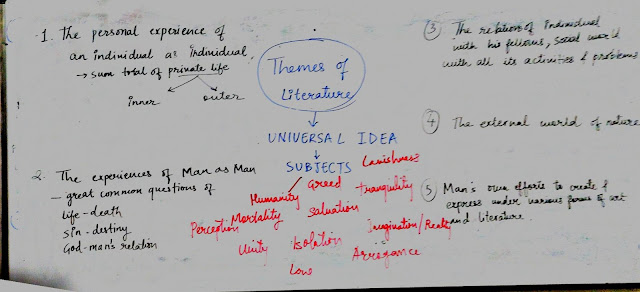Welcome Readers,
William Henry Hudson, in his exploration of the subjects of literature, outlines a comprehensive framework for understanding the vast array of themes that literature can encompass.
THEMES OF LITERATURE
1. Personal Experiences of the Individual:
Hudson begins by recognizing that one of the primary sources of literary material is the individual's personal experiences. This includes:
- Outer Life: The tangible, observable events and interactions that make up an individual's daily existence.
- Inner Life: The internal, psychological experiences, emotions, thoughts, and reflections that define a person's private life.
Literature in this category delves into the subjective world of the individual, exploring the unique perspective and personal journey of a single person. This can include autobiographies, personal essays, diaries, and lyrical poetry, which offer intimate insights into the human condition through the lens of personal experience.
2. Experiences of Man as Man
Hudson identifies a second category that transcends individual experiences to address universal human concerns. These are the fundamental questions and themes that are common to all of humanity:
- Life and Death: The existential questions about the meaning and purpose of life, and the inevitability of death.
- Sin and Destiny: Moral and ethical considerations, the nature of good and evil, and the concept of fate.
- God and Man's Relationship with God: Religious and spiritual explorations, the search for divine understanding, and the role of faith in human life.
- Hope of the Race: Collective aspirations, fears, and the future of humanity.
This category encompasses philosophical, theological, and existential literature, including works that grapple with the big questions of existence and the human spirit's quest for meaning.
3. Relations with Fellow Humans
The third group addresses the individual's social interactions and the broader social world:
- Social Activities: The dynamics of social life, including customs, traditions, and communal activities.
- Social Problems: Issues such as justice, inequality, power structures, and social change.
Literature in this category examines the complexities of human relationships and societal structures, often through novels, plays, social commentary, and satire. It reflects on how individuals relate to each other within the fabric of society and addresses both the harmony and conflicts inherent in social interactions.
4. The External World of Nature
Hudson’s fourth category focuses on humanity’s relationship with the natural world:
- Nature: Observations and reflections on the physical environment, landscapes, flora and fauna, and the broader ecosystem.
- Human Relations with Nature: How humans interact with, are influenced by, and impact the natural world.
This includes nature writing, pastoral literature, and ecological works that celebrate the beauty of nature, explore environmental issues, or use natural settings as metaphors for human experiences.
5. Efforts to Create and Express in Literature and Art
The final category explores the creative and expressive efforts of humanity through various forms of literature and art:
- Literary Creation: The process of writing and the exploration of literary forms, genres, and techniques.
- Artistic Expression: The broader realm of artistic endeavors, including visual arts, music, and performance, and their relationship to literature.
This category includes works of literary criticism, essays on aesthetics, and meta-literary works that reflect on the nature of literature and the arts themselves. It considers how humans strive to express their inner and outer worlds through creative endeavors.
Conclusion
Hudson's classification of literary subjects provides a structured approach to understanding the rich diversity of themes in literature. By categorizing them into personal experiences, universal human concerns, social interactions, nature, and creative efforts, Hudson offers a comprehensive framework that captures the essence of what literature seeks to explore. This systematic analysis helps in appreciating the depth and breadth of literary works and their reflections on the myriad facets of human life.
Reference:
Hudson, William Henry. An introduction to the study of literature. Harrap, 1919.


Post a Comment